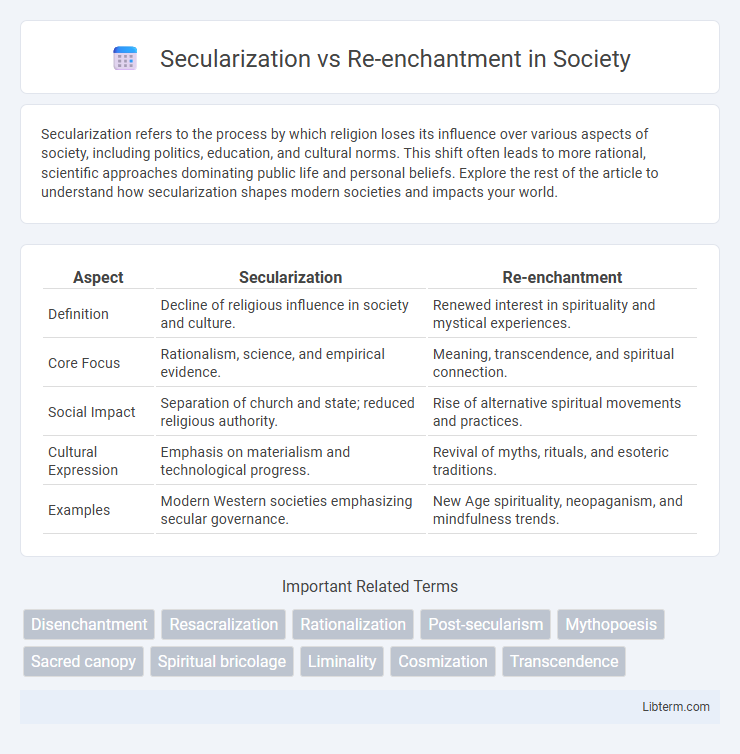Secularization refers to the process by which religion loses its influence over various aspects of society, including politics, education, and cultural norms. This shift often leads to more rational, scientific approaches dominating public life and personal beliefs. Explore the rest of the article to understand how secularization shapes modern societies and impacts your world.
Table of Comparison
| Aspect | Secularization | Re-enchantment |
|---|---|---|
| Definition | Decline of religious influence in society and culture. | Renewed interest in spirituality and mystical experiences. |
| Core Focus | Rationalism, science, and empirical evidence. | Meaning, transcendence, and spiritual connection. |
| Social Impact | Separation of church and state; reduced religious authority. | Rise of alternative spiritual movements and practices. |
| Cultural Expression | Emphasis on materialism and technological progress. | Revival of myths, rituals, and esoteric traditions. |
| Examples | Modern Western societies emphasizing secular governance. | New Age spirituality, neopaganism, and mindfulness trends. |
Understanding Secularization: Definitions and Theories
Secularization refers to the process by which religion loses social, cultural, and political significance in modern societies, characterized by the decline of religious beliefs, practices, and institutions. Key theories include Max Weber's notion of rationalization, where scientific reasoning replaces magical thinking, and Peter Berger's concept of the "disenchantment of the world," highlighting the diminishing role of sacred meaning in everyday life. Sociologists debate secularization's extent and outcomes, examining varying degrees of religious influence across different cultures and historical periods.
The Historical Roots of Secularization
The historical roots of secularization trace back to the Enlightenment era, where reason and scientific inquiry began to challenge religious authority and traditional beliefs. Key figures like Descartes and Newton contributed to a worldview prioritizing empirical evidence over spiritual explanations, fostering the separation of church and state. This paradigm shift laid the foundation for modern secular societies by diminishing the church's influence in public and intellectual life, creating space for re-enchantment movements seeking renewed meaning through spirituality and mysticism.
Forces Driving Secularization in Modern Societies
Forces driving secularization in modern societies include scientific advancements that challenge traditional religious explanations and promote rational, evidence-based thinking. Urbanization and increased education levels contribute to diminished reliance on religious authority as social institutions diversify and individual autonomy expands. Furthermore, pluralism and globalization expose individuals to a variety of belief systems, reducing the dominance of any single religious worldview and fostering secular attitudes.
Challenging Secularization: What is Re-enchantment?
Re-enchantment challenges secularization by reintroducing a sense of wonder, spirituality, and meaning into modern life, often through alternative spiritualities, environmentalism, and cultural practices that emphasize connection and transcendence. It counters the narrative of a purely rational, disenchanted world by highlighting experiences that invoke mystery, sacredness, and emotional depth. This resurgence reflects a shift towards integrating spiritual values within contemporary society, resisting the exclusive dominance of scientific rationality.
Cultural Symbols and Myths in Re-enchantment
Re-enchantment revives cultural symbols and myths by restoring their mystical and spiritual significance in contemporary society, countering secularization's rational and scientific worldview. Traditional symbols such as rituals, myths, and sacred narratives are reinterpreted to foster a sense of meaning, identity, and transcendence. This resurgence of symbolic meaning strengthens communal bonds and provides alternative frameworks for understanding existence beyond empirical reality.
The Role of Technology in Re-enchantment
Technology plays a pivotal role in the process of re-enchantment by creating immersive experiences that evoke wonder and awe, blending scientific advancements with spiritual or mystical elements. Virtual reality, augmented reality, and AI-driven interactive media contribute to a renewed sense of connection and meaning, often filling gaps left by secularization. These technologies transform how individuals perceive reality, fostering new forms of enchantment through personalized and transformative encounters.
Comparative Case Studies: Secularization vs. Re-enchantment
Comparative case studies on secularization versus re-enchantment reveal distinct patterns in societal transformations where secularization often correlates with the decline of religious authority and the rise of rational-legal institutions, as documented in Western Europe. In contrast, re-enchantment manifests through renewed interest in spirituality, mysticism, and alternative belief systems, exemplified by movements in Latin America and parts of Asia where traditional religious values are revitalized or new forms of spirituality emerge. These case studies highlight the complex interplay between modernization, cultural context, and the persistence or resurgence of spiritual frameworks shaping contemporary social dynamics.
Impacts on Morality, Values, and Social Behavior
Secularization leads to a decline in traditional religious authority, reshaping morality and values toward individualism and rational ethics, which often results in more pluralistic social behavior. Re-enchantment, through renewed spiritual or mystical beliefs, revives collective moral frameworks and symbolic meaning, influencing social cohesion and prosocial actions. These dynamics impact societal norms by either promoting secular ethical relativism or reinforcing shared transcendental values that guide interpersonal conduct.
Future Trends: A Post-secular World?
Emerging research indicates a shift toward a post-secular world where secularization coexists with processes of re-enchantment, reflected in the revival of spirituality, alternative belief systems, and the integration of science with spirituality. Trends highlight increasing interest in mindfulness, ecological spirituality, and hybrid religious practices that challenge the strict secular-religious dichotomy. Forecasts suggest that future societies may embrace pluralistic frameworks, fostering dialogue between rational secularism and diverse spiritual expressions.
Navigating the Balance: Coexistence of Secular and Enchanted Perspectives
Navigating the balance between secularization and re-enchantment involves recognizing the persistent coexistence of rational, scientific worldviews with spiritual and mystical experiences in contemporary society. Secular frameworks emphasize empirical knowledge and institutional neutrality, while re-enchantment fosters renewed interest in symbolism, ritual, and transcendence, reflecting human needs for meaning beyond materialism. This coexistence manifests in cultural practices, where secular institutions accommodate enchanted elements like meditation, astrology, or ecological spirituality, illustrating a dynamic interplay rather than mutual exclusion.
Secularization Infographic

 libterm.com
libterm.com